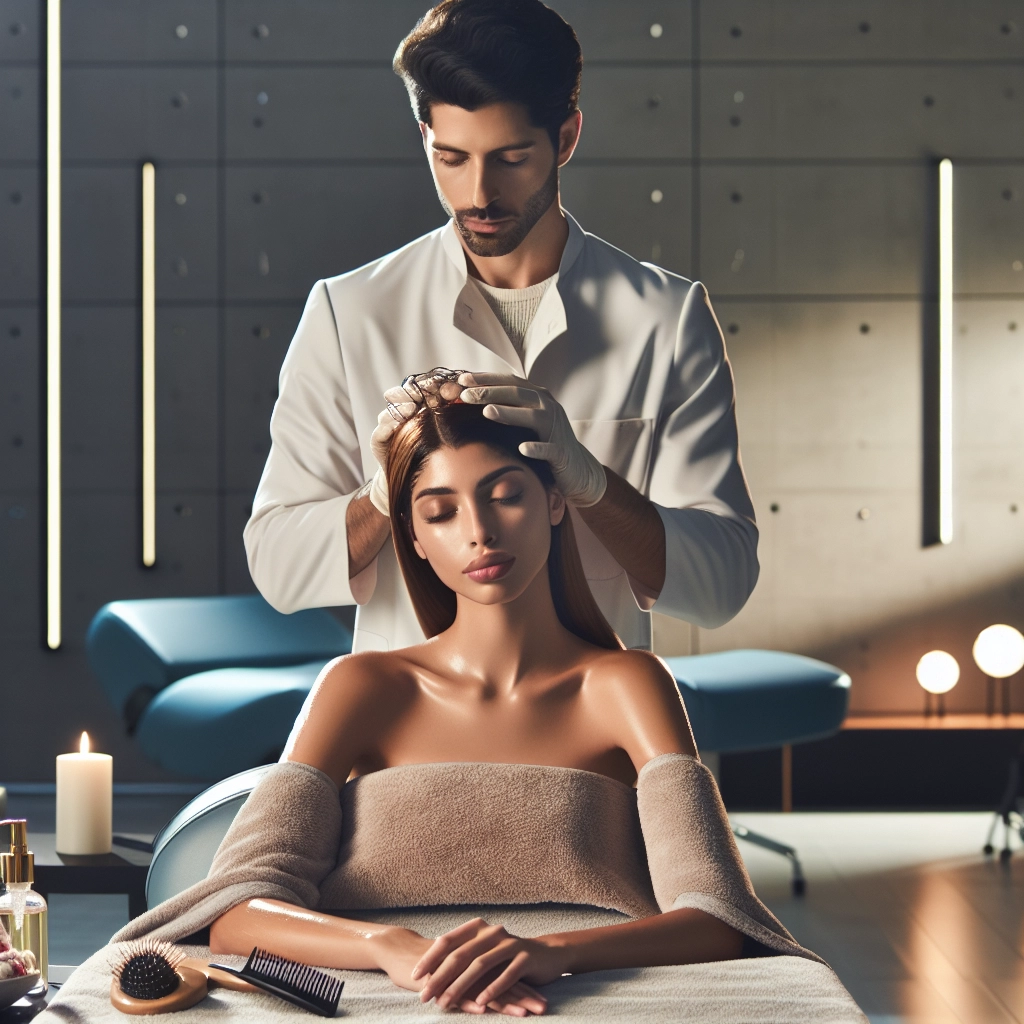

Cortisol, the primary stress hormone, can disrupt the balance of hormones in the body, including testosterone and estrogen, which are important for hair growth.
When cortisol levels are altered, it can lead to hair loss due to the imbalance of hormones in the body.
Extended periods of high cortisol levels can result in the adrenal glands making less of the hormones that support healthy hair growth.
Check out this Youtube video: Discover how cortisol can contribute to hair loss and learn about 6 root causes of hormonal hair loss with Dr. Berg.
Understanding Cortisol Hair Loss
The Role of Cortisol in Hair Loss
Cortisol, known as the stress hormone, plays a significant role in hair loss. Elevated cortisol levels due to chronic stress can lead to a condition called telogen effluvium, causing hair follicles to enter a resting phase prematurely and resulting in substantial hair loss.
How Cortisol Impacts Hair Growth
High levels of cortisol can disrupt the normal hair growth cycle, leading to reduced hair growth. Cortisol has been shown to reduce the synthesis and accelerate the degradation of essential skin elements, such as hyaluronan and proteoglycans, by approximately 40%, impacting the function and cyclic regulation of the hair follicle.
Identifying the Signs of Cortisol-Induced Hair Loss
Signs of cortisol-induced hair loss include sudden hair shedding during routine activities like combing or washing. Additionally, conditions like trichotillomania and telogen effluvium can be induced by stress or hormonal imbalance, resulting in a disruption of the normal hair growth cycle.
| Signs of Cortisol-Induced Hair Loss |
|---|
| Sudden hair shedding |
| Disruption of normal hair growth |
| Condition-induced hair loss |
The Connection Between Stress and Cortisol Hair Loss
Cortisol, known as the stress hormone, plays a significant role in hair loss. When stress activates the hypothalamic-pituitary-adrenal (HPA) axis, it triggers the adrenal glands to release cortisol.
This elevated cortisol level disrupts the hair growth cycle, leading to hair thinning and loss.
How Stress Contributes to Elevated Cortisol Levels
The stress response involves the HPA axis and the sympathetic-adrenal-medullary (SAM) axis. When a person experiences stress, the HPA axis initiates a cascade of hormone release, including cortisol.
Chronic stress can cause prolonged elevation of cortisol, which negatively impacts hair follicles, leading to hair loss.
The Impact of Chronic Stress on Hair Health
Chronic stress and elevated cortisol levels disrupt the hair growth cycle, leading to telogen effluvium, a condition characterized by excessive shedding of hair. This can result in noticeable thinning of the hair and even bald patches, significantly impacting an individual’s self-esteem and confidence.
Stress Management Techniques for Reducing Cortisol Levels
Effective stress management techniques can help reduce cortisol levels and minimize the risk of cortisol-related hair loss. Practices such as yoga, meditation, deep breathing exercises, and spending time in nature can effectively lower stress and cortisol levels, promoting healthier hair growth.
Cortisol Hair Loss Treatment Options
Lifestyle Changes for Managing Cortisol Levels
For effective management of cortisol levels and prevention of hair loss, incorporating lifestyle changes is crucial. Practicing stress-reducing activities such as yoga, meditation, or engaging in hobbies can significantly lower cortisol levels. Regular exercise also plays a vital role in regulating cortisol, thus promoting healthier hair growth.
Dietary Adjustments to Support Hair Growth
To support hair growth and combat cortisol-induced hair loss, dietary adjustments are essential. Incorporating a diet rich in whole foods and leafy greens is beneficial for hair health. Consumption of foods high in iron, magnesium, zinc, and biotin can aid in promoting optimal hair growth and minimizing the impact of cortisol-induced hair loss.
Topical Treatments for Cortisol-Induced Hair Loss
When addressing cortisol-induced hair loss, leveraging topical treatments is crucial. FDA-approved topical minoxidil, oral finasteride, and low-level light therapy have been proven effective in combating hair loss. Additionally, products like Rogaine minoxidil foam recommended by dermatologists can provide effective treatment for stress-related hair loss.
Professional Treatments for Cortisol Hair Loss
For professional treatments of cortisol hair loss, medications play a crucial role in regulating cortisol levels and addressing hair loss. Medicines such as ketoconazole, osilodrostat (Isturisa), mitotane (Lysodren), levoketoconazole (Recorlev), and metyrapone (Metopirone) are commonly prescribed to control cortisol production at the adrenal gland.
Medications for Regulating Cortisol
Medications like ketoconazole, osilodrostat, and metyrapone are effective in managing cortisol production, thereby impacting hair loss. These medications work by regulating cortisol levels within the body, which in turn can help reduce hair loss caused by cortisol imbalances.
Hair Transplant and Restoration Procedures
In addition to medication, hair transplant and restoration procedures offer viable solutions for cortisol-related hair loss. Modern hair restoration surgeries, such as follicular unit transplantation (FUT), provide effective and long-lasting results, offering hope to individuals struggling with cortisol-induced hair loss.
Therapies and Procedures for Stress Management
Stress management therapies and procedures are beneficial in addressing cortisol hair loss. Deep breathing techniques, mindfulness-based stress reduction therapy, meditation, yoga, tai chi, and qigong are effective in lowering cortisol levels, thus contributing to the management of cortisol-related hair loss.
| Medications | Hair Transplant and Restoration | Stress Management Therapies |
|---|---|---|
| Ketoconazole | Follicular Unit Transplantation (FUT) | Deep Breathing Techniques |
| Osilodrostat | Modern Hair Restoration Surgeries | Mindfulness-based Stress Reduction |
| Metyrapone | Meditation, Yoga, Tai Chi, and Qigong |
Natural Remedies for Cortisol-Induced Hair Loss
Herbal Supplements for Cortisol Regulation
| Herbal Supplement | Benefit |
|---|---|
| Ashwagandha | Reduces cortisol levels and stress |
| Rhodiola Rosea | Helps alleviate stress and anxiety, reducing cortisol |
| Holy Basil | Aids in lowering cortisol levels and promotes relaxation |
Aromatherapy and Essential Oils for Stress Reduction
When it comes to aromatherapy, essential oils such as lavender, chamomile, and bergamot are renowned for their stress-reducing properties. These oils can be diffused or applied topically to promote relaxation and combat cortisol-induced hair loss.
Scalp Massages and Relaxation Techniques
Incorporating scalp massages into your wellness routine can effectively reduce cortisol levels and promote hair growth. Additionally, relaxation techniques like deep breathing, meditation, and yoga can contribute to managing cortisol levels, minimizing the impact of stress-related hair loss.
The Role of Exercise in Managing Cortisol Hair Loss
The Impact of Physical Activity on Cortisol Levels
Regular physical activity has a profound impact on cortisol levels in the body. Engaging in moderate to high intensity exercises has been shown to provoke increases in circulating cortisol levels.
However, it’s important to note that consistent physical activity also promotes the release of endorphins, which counteracts the effects of cortisol by reducing stress hormones in the body.
Recommended Exercise Routine for Reducing Cortisol-Induced Hair Loss
Incorporating regular aerobic exercises such as cycling, walking, and swimming into your routine can significantly improve blood circulation in the scalp. This improved circulation promotes a healthier environment for hair growth.
Additionally, cardiovascular exercises help lower cortisol levels, ultimately mitigating the risk of cortisol-induced hair loss.
Incorporating Yoga and Meditation into Your Workout Regimen
Yoga and meditation offer unique benefits in managing cortisol levels. Yoga acts on the hypothalamus, inhibiting the activity of the anterior pituitary gland and decreasing the production of adrenocorticotropic hormone (ACTH).
This reduction ultimately affects the adrenal gland, leading to decreased cortisol synthesis and providing potential relief from cortisol-induced hair loss.
Maintaining Healthy Hair Amid Cortisol-Induced Hair Loss
Stress and cortisol can wreak havoc on your hair, leading to increased hair loss and reduced hair growth. To combat cortisol-induced hair loss, it’s crucial to maintain a healthy hair care routine that promotes hair strength and vitality.
Proper Hair Care Routine for Individuals with Elevated Cortisol Levels
When dealing with heightened cortisol levels, it’s essential to adopt a gentle and nurturing hair care routine. Utilize sulfate-free shampoos and conditioners to avoid further aggravating the scalp.
Additionally, consider incorporating regular scalp massages to stimulate blood flow and promote hair growth.
Choosing the Right Hair Products for Managing Cortisol-Induced Hair Loss
Selecting the appropriate hair products is pivotal in managing cortisol-induced hair loss. Look for products enriched with nourishing ingredients such as biotin, keratin, and vitamin E to strengthen the hair from the roots.
Furthermore, opt for products specifically formulated to combat hair thinning and promote overall hair health.
Protecting Your Hair from Environmental Stressors
To shield your hair from environmental stressors aggravated by cortisol, consider using protective accessories such as hats or scarves to minimize exposure to pollutants and harsh weather conditions. Additionally, amplify your hair’s defense against pollution by integrating antioxidant-rich hair care products into your daily routine.
| Factors | Tips |
|---|---|
| Proper Hair Care Routine | Use sulfate-free products and incorporate scalp massages for enhanced blood circulation. |
| Choosing the Right Products | Opt for biotin, keratin, and vitamin E-infused products designed to combat hair thinning. |
| Protecting from Environmental Stressors | Utilize hats, scarves, or specialized hair wraps for added protection against pollutants and harsh weather. |
Seeking Professional Help for Cortisol-Induced Hair Loss
Cortisol-induced hair loss can be distressing, and seeking professional help is crucial. Consulting with a trained professional is essential to properly address cortisol-induced hair loss. A specialist can provide personalized advice and treatment options tailored to your specific needs, helping you regain confidence and prevent further hair loss.
The Importance of Consulting with a Trained Professional
Seeking professional help is important as trained professionals have the expertise to assess cortisol-induced hair loss comprehensively. They can identify underlying factors contributing to hair loss and recommend suitable interventions. By consulting with a specialist, individuals can access evidence-based treatments, ensuring a more targeted approach to managing cortisol-induced hair loss.
Finding the Right Specialist for Cortisol-Induced Hair Loss Treatment
When seeking treatment for cortisol-induced hair loss, it is imperative to find the right specialist. Look for dermatologists or trichologists with expertise in treating hair loss related to hormonal imbalances. Additionally, consider professionals who have experience in addressing cortisol-induced hair loss specifically, as they can offer tailored solutions to effectively manage this condition.
What to Expect During a Consultation for Cortisol-Induced Hair Loss
During a consultation for cortisol-induced hair loss, individuals can expect a comprehensive assessment of their medical history and hair health. This may involve discussions about stress levels, lifestyle factors, and previous hair care routines. The specialist will likely conduct a thorough examination of the scalp and hair to determine the extent of hair loss and assess any related scalp conditions.
| Aspect | Details |
|---|---|
| Medical History | In-depth discussion about stress levels, lifestyle, and previous hair care practices. |
| Scalp and Hair Examination | Comprehensive assessment to determine the extent of hair loss and identify any related scalp conditions. |
| Treatment Recommendations | Personalized treatment plans tailored to address cortisol-induced hair loss and promote hair regrowth. |
Seeking professional help for cortisol-induced hair loss is crucial in effectively addressing this condition. Consulting with trained specialists, finding the right healthcare professional, and understanding what to expect during a consultation are essential steps on the path to managing cortisol-induced hair loss effectively.
Understanding the Limitations of Cortisol Hair Loss Treatment
When considering cortisol hair loss treatment, it’s crucial to have realistic expectations for treatment outcomes. While some treatments may promote hair growth, the effectiveness can vary depending on individual factors such as the underlying cause of hair loss and overall health.
Realistic Expectations for Treatment Outcomes
Patients undergoing cortisol hair loss treatment should understand that visible results may not be immediate and can take several months to become noticeable. It’s important to manage expectations and remain patient while the treatment takes its course, as individual responses to treatment can differ.
Potential Challenges in Managing Cortisol-Induced Hair Loss
Managing cortisol-induced hair loss may pose several challenges, including the necessity to address the root cause of elevated cortisol levels. Additionally, identifying and addressing any underlying psychological or physiological factors contributing to cortisol-induced hair loss can be complex and requires a comprehensive approach to treatment.
Addressing the Emotional Impact of Cortisol-Induced Hair Loss
The emotional impact of cortisol-induced hair loss should not be underestimated, as it can significantly affect an individual’s self-esteem and overall well-being. It’s important to provide emotional support and guidance to individuals undergoing cortisol hair loss treatment, acknowledging the psychological effects and offering avenues for coping and support.
Maintaining Long-Term Hair Health After Cortisol Treatment
It’s essential to adopt continued stress management strategies after cortisol treatment to support long-term hair health. Activities such as yoga, meditation, and deep breathing exercises can effectively lower cortisol levels and promote hair regrowth.
Continued Stress Management Strategies
Continued stress management strategies are crucial for maintaining healthy cortisol levels and preventing further hair loss after cortisol treatment. Engaging in regular physical exercise, practising relaxation techniques, and seeking professional help can all contribute to a healthier stress response.
Lifestyle Changes to Sustain Healthy Cortisol Levels
Making lifestyle changes, such as prioritizing quality sleep, consuming a balanced diet, and reducing caffeine intake, is vital for sustaining healthy cortisol levels post-treatment. These adjustments can significantly support hair regrowth and overall well-being.
Regular Monitoring and Maintenance for Hair Growth
Regular monitoring and maintenance for hair growth involve keeping track of cortisol levels, nutrition, and overall health. It’s important to consult healthcare providers for routine check-ups and hair care recommendations to ensure long-term hair health sustainability.
Recommended Amazon Products for Cortisol-Induced Hair Loss Treatment
Here’s a curated list of products that can help you manage cortisol-induced hair loss with ease. These recommendations are based on popularity, functionality, and positive reviews.
Vitafusion Extra Strength Biotin Gummies


These biotin gummies provide essential nutrients that support healthy hair growth. They are a popular choice and have received positive reviews for their effectiveness in addressing hair loss.
ArtNaturals Argan Oil Hair Mask


This hair mask is infused with argan oil, which helps to nourish and strengthen hair. It is known for its restorative properties and is highly rated by users for its ability to improve hair health.
iRestore Laser Hair Growth System


The iRestore laser system is designed to stimulate hair growth using low-level laser therapy. It has garnered positive feedback and is a popular choice for those seeking non-invasive hair loss treatment options.
PURA D’OR Original Gold Label Anti-Thinning Shampoo & Conditioner Set


This shampoo and conditioner set is formulated with natural ingredients to target hair thinning and promote stronger, healthier hair. It has received high ratings for its effectiveness in reducing hair loss.
Briogeo Scalp Revival Charcoal + Coconut Oil Micro-Exfoliating Shampoo


This exfoliating shampoo is designed to cleanse and detoxify the scalp, promoting a healthy environment for hair growth. It is well-loved by users for its ability to improve scalp health.
Here’s a comparison of the recommended products:
| Product | Pros | Cons |
|---|---|---|
| Vitafusion Extra Strength Biotin Gummies | – Easy to consume- Contains essential nutrients- Positive reviews | – Results may vary |
| ArtNaturals Argan Oil Hair Mask | – Restorative properties- Nourishes and strengthens hair- Highly rated | – Scent may be strong for some |
| iRestore Laser Hair Growth System | – Non-invasive treatment- Stimulates hair growth- Positive feedback | – Higher price point |
| PURA D’OR Original Gold Label Anti-Thinning Shampoo & Conditioner Set | – Formulated with natural ingredients- Effectively reduces hair loss- High ratings | – May not work for everyone |
| Briogeo Scalp Revival Charcoal + Coconut Oil Micro-Exfoliating Shampoo | – Cleanses and detoxifies the scalp- Improves scalp health- Well-loved by users | – May be drying for some |
Top Recommended Product for Cortisol-Induced Hair Loss Treatment
If you’re looking for the best solution for managing cortisol-induced hair loss, we highly recommend the iRestore Laser Hair Growth System. This non-invasive treatment option has garnered positive feedback and is designed to stimulate hair growth effectively.


Ready to improve your hair health? Check out the iRestore Laser Hair Growth System today for the best results!


Conclusion
It’s evident that climate change is a pressing issue that requires immediate action. The negative impacts of climate change on the environment, economy, and human health are clear, and it’s crucial for governments and individuals to take steps to mitigate these effects.
Additionally, it’s essential for countries to work together to implement policies that reduce greenhouse gas emissions and promote sustainable practices. Collaboration and cooperation on a global scale are key in addressing climate change and ensuring a sustainable future for the planet and all its inhabitants.
While the challenges of climate change are daunting, there are opportunities for innovation and positive change. By investing in renewable energy, conservation efforts, and technological advancements, we can work towards a more sustainable and resilient planet for future generations.












